CNN
—
In May 2024, after 32 years living in Southern California, Karina Nuvo hit a wall.
Coming out of a pandemic-induced lull in the singing gigs that made her happy and left her feeling fulfilled, the two-time Grammy-nominated artist found herself under an incredible amount of stress.
She’d taken on jobs as a real estate agent and property manager at a Pasadena apartment building where she’d had a string of rough moments, including encountering a tenant dead in his apartment.
Nuvo was also busy taking care of her octogenarian father.
“I couldn’t focus on singing, I couldn’t focus on real estate, I had to put my dad in an assisted living facility. My health just took a toll, it was killing me,” says Nuvo, 55.
By May 2024, with the political climate in the US on tenterhooks again as Donald Trump’s presidential campaign swung into full tilt, Nuvo says it all “just felt like too much.”
“I made a decision that I was leaving, that I was going to Europe. The job stress was what pushed my situation, but also politically I just couldn’t fathom what was coming,” she says.
She told her parents about her plans to leave.
It was then that Nuvo’s father, Jose Novo (Karina uses a modified spelling of this surname professionally), reminded her that they’d always had a way out, a path to try living a different kind of life in Spain, since they were able to apply for citizenship in that country.
Novo was born in Camagüey, Cuba, and came to the United States for a better life at the age of 21. But his father (Karina’s grandfather) was born in Spain, which entitled both him and his children to pursue citizenship through the ley de nietos (the “grandchildren’s law”).
Also called the Law of Democratic Memory, the ley de nietos, set to expire October 21, 2025, grants descendants of Spaniards persecuted during the Spanish Civil War and subsequent Francisco Franco dictatorship a path to Spanish citizenship.
Nuvo told her father, then 87, she would go to Spain and submit her application for Spanish citizenship there.
“His response was, ‘Please, I don’t want to die here in this place,’” she says. So she asked him if he wanted to move there with her.
“He didn’t even hesitate, he was like, ‘Yep,’” Nuvo says.
So, she set to work selling most of their worldly possessions on Facebook Marketplace, packed a few suitcases and put her plan into motion.
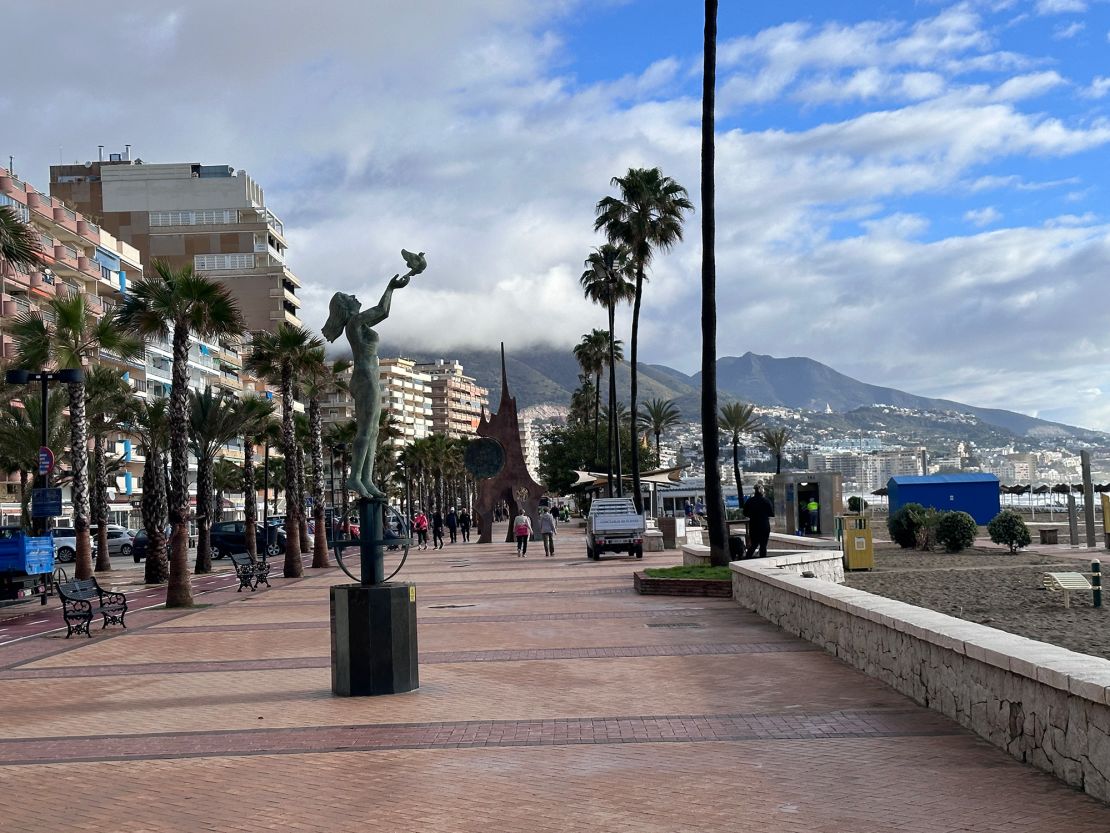
Crossing the Atlantic for a better life
The only time Nuvo and her father had attempted to travel to Spain together was on a cruise that left from Fort Lauderdale in 2022. He got Covid long before they made it to Spain. They had to disembark from the ship in the Azores, where she checked her dad into a hospital.
“It was the only time I tried to take him to Spain, and I failed miserably,” Nuvo says.
So before leaving California, Nuvo told her father, a bladder cancer survivor, that they had to be on the same page. If something similar happened once they moved to Spain — if he got sick and wasn’t well enough to live in their new shared home — he might have to go back into assisted living there. Jose agreed.
Nuvo set to work looking for a place for the two of them to live, tapping the real estate website Idealista for potential rentals and talking to brokers to figure out the best location in Spain for a move.
Originally, she says, she was set on Málaga, along the Andalusia coast, but was dissuaded by the housing prices. A broker suggested Nuvo consider the nearby Costa del Sol town of Fuengirola, about 20 miles south, which has similarly flat terrain that would be easy for her father to navigate, as well as a lower cost of living.
Nuvo was still in California when she found a nearly 1,200-square-foot apartment in the town with two bedrooms that looked perfect. It was a few blocks from the beach and had a view of the sparkling Mediterranean from the balcony.
“I went, ‘oh my god, it’s dad’s dream, by the ocean,’” says Nuvo. The monthly rent was 1,050 euros (around $1,150), a fraction of what they’d both been paying in California to live.
After a stop in Miami on the way to Europe, they landed in Spain in September 2024 with six pieces of luggage and her dad’s walker and wheelchair in tow.
“I have a photo of dad in front of the apartment right after we got to Fuengirola with a huge smile. For me, though, because of the emotional trek it was to get there, I went into a full panic attack at what I’d done,” Nuvo recalls.
She called her son, 20, who’s in college back in California, and cried, expressing her doubts. But he assured her it was all going to be OK.
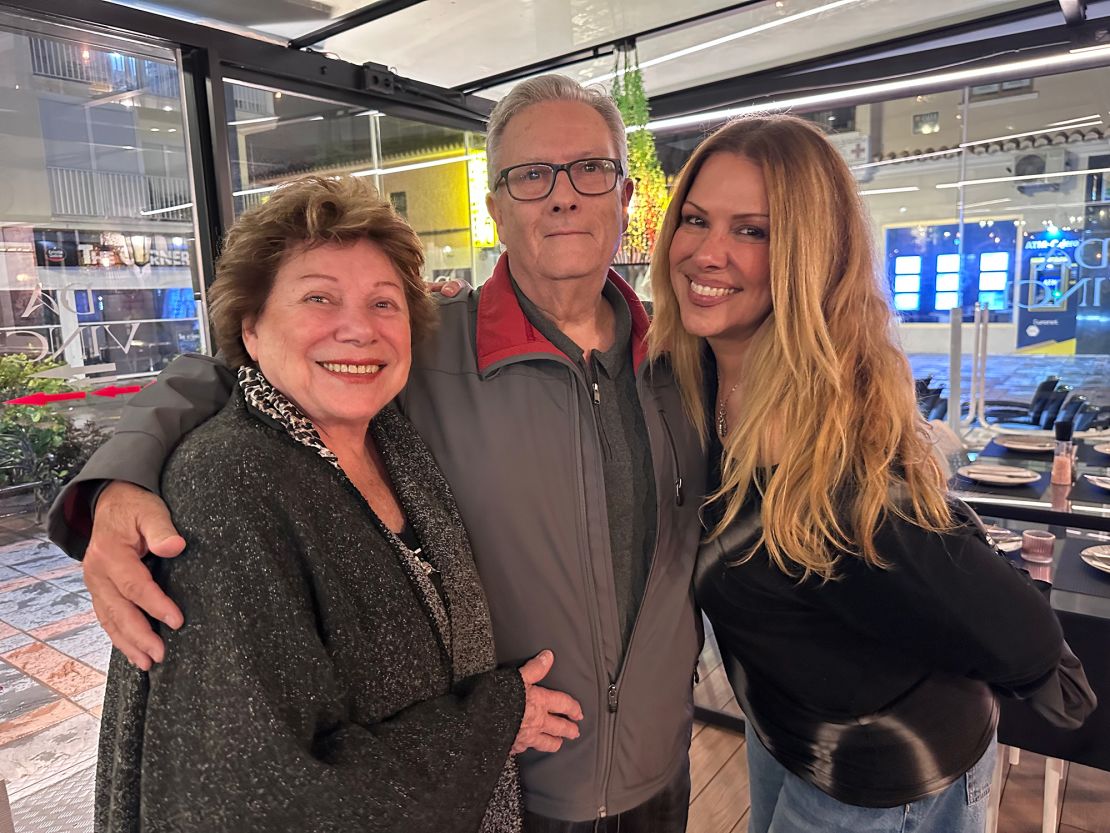
It’s all in the family
Just a week after Nuvo and her father arrived in Spain, her mother and stepfather, Gloria and Cesar Tarafa, came to visit for 15 days. “We’re a modern family, everyone gets along,” Nuvo says.
Nuvo’s mother and stepfather were born in Cuba, like her father, but had spent most of their lives in Miami, and later, California. They had been living for years in a fixed-income adult community in Monrovia near Pasadena.
It didn’t take long before Gloria and Cesar, then 87 and 73, decided they would make the move to Fuengirola, too. They both also have the right to apply for Spanish citizenship since they have parents or grandparents who were born in Spain.
The couple, who are retired, returned to the US from their Spanish vacation in October 2024, sold nearly everything they owned and were back in Fuengirola a month later. They moved into the apartment Nuvo shared with her father and set about applying for Spanish citizenship.
Cesar says the political climate in the US and cost of living in the Los Angeles area both contributed to their decision to leave.
Cesar first went to Spain shortly before his 15th birthday (the age when military service was mandatory for Cuban youth back then), when his parents sent him away from the island to stay with family friends near Madrid. (He later left for the US).
He and Gloria, who met in Miami as members of the Cuban diaspora there, had also vacationed in Spain on several occasions and enjoyed it. And with Spanish as their mother tongue, imagining a move there was easy, he says.

“We decided we have to make sure we enjoy our lives for however many years we have left,” he says, adding that he knew the quality of life in Spain — and, in particular, Andalusia — was good.
“The culture is also very akin to our culture in Cuba. Cubans have a lot of similarities with the Andalusian way of speaking and expressing ourselves, moving our hands and exaggerating. So we knew if we were going to make the change, it would be to this part of Spain,” he says.
Cesar says the couple’s lifestyle has changed for the better because they can “do more with less” in Spain.
“You don’t even have to spend a lot of money. You can just go out and see people walking and see the nightlife. This city is alive. People go to dinner at 9 or 10 o’clock at night,” he says.
Back home in Monrovia, the couple would usually be in for the night at 6 p.m. he says, watching TV.
“Here at 6 o’clock you’re having a merienda (snack) and then you go to dinner at 9. And the funny thing is people don’t rush you at restaurants. You can have a cup of coffee and sit down at a table for two hours. It’s just a whole different mentality,” he says.
‘I just love it’
Cesar admits it’s taken some getting used to Spanish bureaucracy and things moving a little bit slower compared to the US, “but the overwhelming quality of life here is just undeniable. We’re just trying to be like a sponge and suck everything in.”
Cesar compared his recent departure from the US for Spain as eliciting similar feelings as when he first left Cuba long ago, since both times he left everything behind.
“I knew when I left Cuba that I was not going to be back ever, and I have the same feeling now,” he says.
Gloria says the people, style and way of living really speak to her in Spain. She left Cuba as a young woman, when she was recruited to work as a flight attendant for PanAm in Miami. She and Cesar lived in Florida for many years before moving to California.
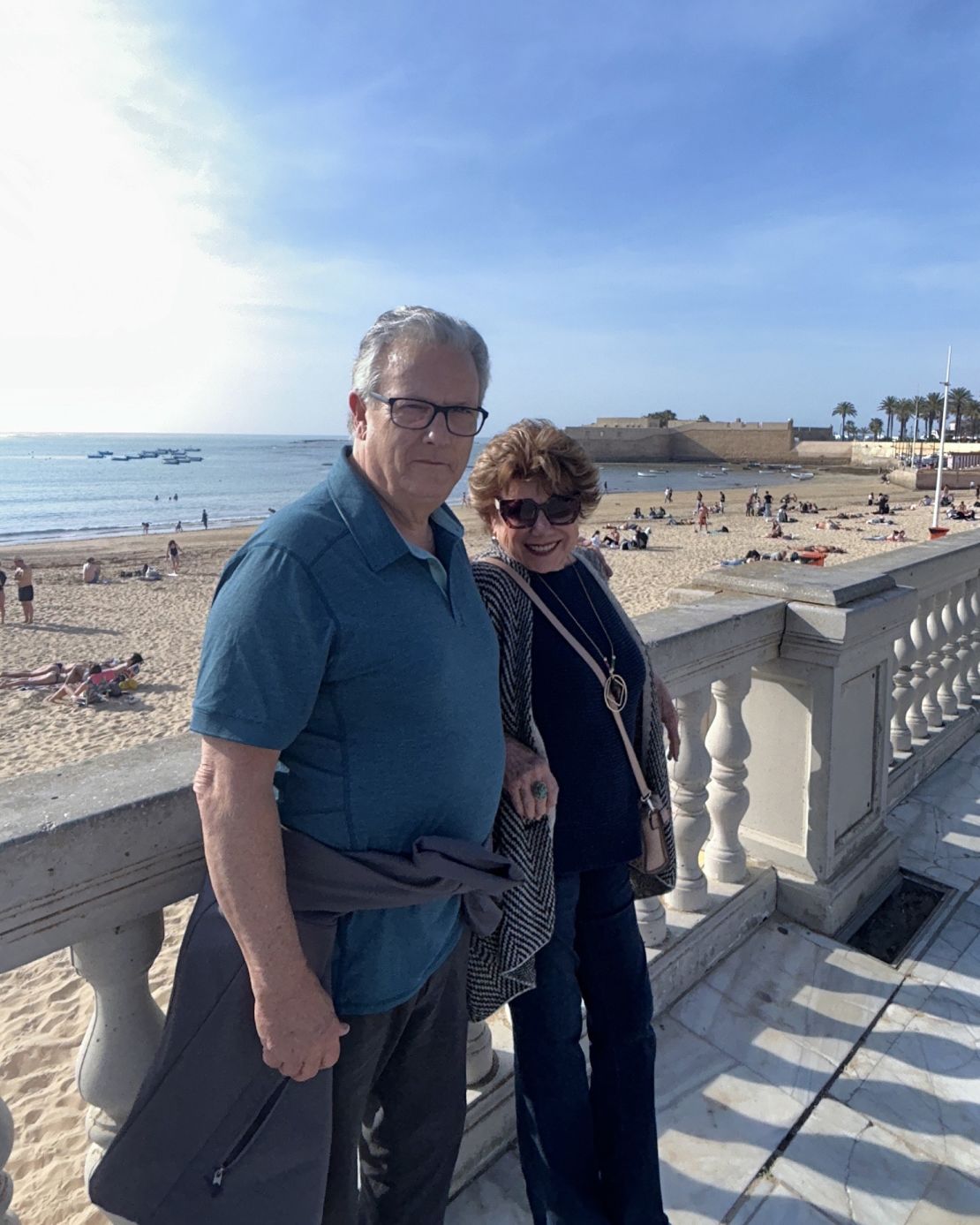
Their American life was so different, especially during the years after the pandemic, she says.
“Our life there was OK. Half of my life is there, and I miss family members. But I have to try to enjoy what is left of me. I’m 88, I’m not young,” Gloria says.
“Here, we go downstairs and have coffee, we sit there and talk. In Monrovia there was no social life for us. I might go to my son’s house or a friend’s once in a while, but that was it,” she says.
“The quality of life here is life. The food, the people and the weather in this part of Spain, I just love it.”
A tough decision
By January of 2025, Nuvo’s father, Jose, was having health complications, she says.
It was becoming far too difficult for her to care for him at home. So together they made the difficult decision to move him into an assisted living facility in February in nearby Marbella, about 20 miles west of Fuengirola.
Nuvo says she felt very guilty and wondered if bringing him to Spain had been a mistake.
“But then he’ll just tell me he loves it. He spent months enjoying Fuengirola. And now he says he’s sitting out looking at the ocean in Spain, eating his favorite foods like tortilla española and croquetas and speaking Spanish with everyone,” she says.
The facility costs 2,300 euros (about $2,500) a month, far less than his assisted living facility in California, and it includes physical therapy, access to a psychologist and all living expenses and meals as well as daily activities.
Nuvo talks to her father every day on the phone and visits him twice a week in his private room with a balcony overlooking a lush garden, which she says feels more like a palace than an assisted living facility.
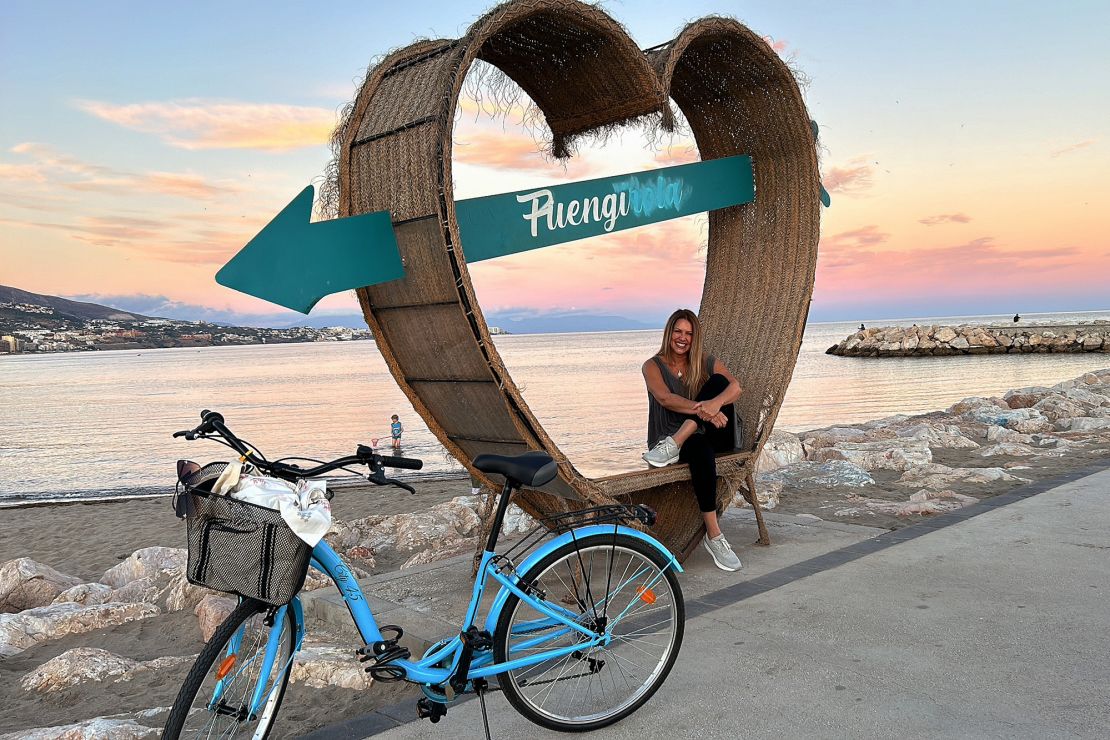
The main reason she moved from California to Spain, Nuvo says, was for a better quality of life and “saving our mental, emotional and physical wellbeing.” It’s a goal she feels she’s so far achieved with her family.
She and her mother and stepfather recently moved into a larger three-bedroom rental apartment in Fuengirola with sea views from a sprawling balcony right in the center of town. The location allows Cesar and Gloria to get out and walk to everything with no car needed and continue enjoying their new Spanish lifestyle. The rent is 1,400 euros, or about $1,500.
Nuvo says her living expenses in Spain compared to Los Angeles have been nearly halved. Once she gets her work permit as a citizen, Nuvo says she plans to get back to what she loves doing for work — pursuing singing gigs around Europe and helping people who are also considering a move find real estate opportunities in Spain.
She loves California, she says, but it was time to go. And she has no regrets.
“Things still take my breath away here, just the kindness of everybody. They have a cherishment and appreciation for their lives. And the elderly are treated like royalty.” she says.
“Even with everything that’s happened, even with my son still living in California, I can’t explain it. I feel like I’m supposed to be here.”
‘One adventure after another adventure’
As for her father, Jose says his whole life has been an adventure, and he chalks this experience up as another one.
“I left Cuba when I was 20 years old. So, from there on I went to Costa Rica, working for my company. Then I went to the Dominican Republic to work for another company. So, it’s been one adventure after another adventure,” he says.
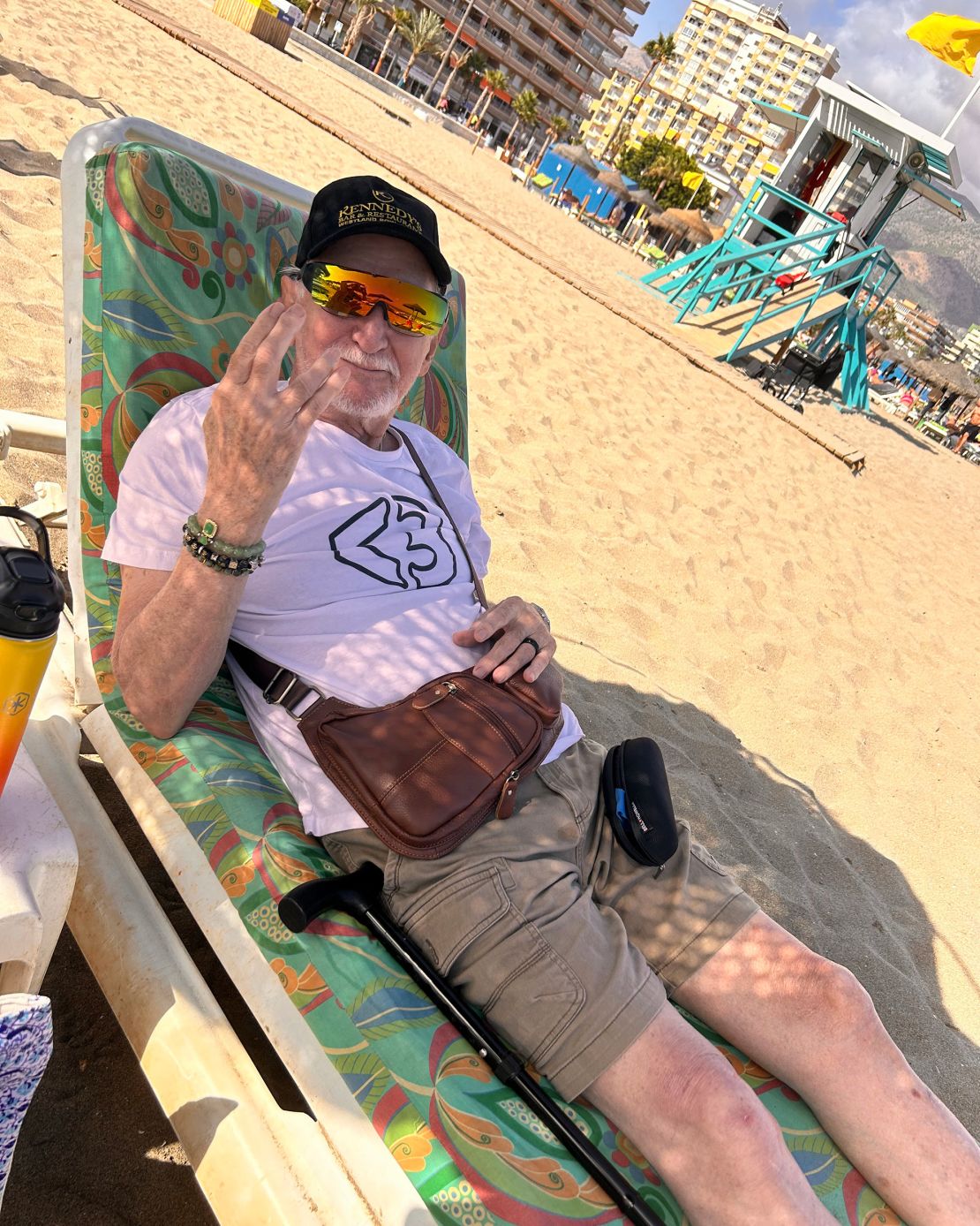
He has no complaints about the assisted living facility in California where he was living before he left.
“People there were very nice to me. And I had people that I care very much for. People here are very good, too,” he says, adding that the cost is a big differentiating point and he finds the Spanish facility “more sophisticated.”
As for any regrets about crossing the ocean to finish out his remaining years, Jose says he has none.
“Why would I? I’m in the country of my family because my father was born in Asturias, and my grandparents on my mother’s side were born in Galicia. I have Spanish blood running through my veins,” he says.
To anyone who’s considering a similar move, no matter at what stage of life, his advice is simple.
“Follow your heart — and don’t be afraid.”
Terry Ward is a Florida-based travel writer and freelance journalist in Tampa who hopes to one day relocate with her family to Europe, too.



